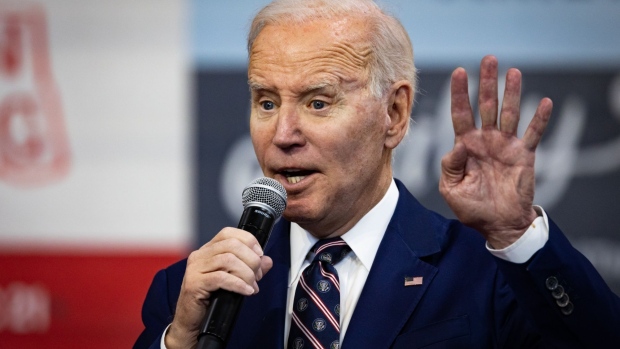Mar 9, 2023
Biden Budget Puts Spotlight on Deficit Crunch Facing Washington
, Bloomberg News

(Bloomberg) -- President Joe Biden’s spending blueprint touted his ideas to shrink the budget deficit but couldn’t erase the harsh arithmetic of government debt: It’s going to get worse.
His record so far is partially a mirage rather than a signal of a strong balance sheet: the $1.7 trillion reduction in the annual deficit under Biden is relative to extraordinary one-time costs of the pandemic, and many of his legislative accomplishments have expanded the shortfall.
The budget Biden unveiled Thursday would trim $3 trillion from deficits over the next decade — but has little chance of being adopted by Congress. And the president’s own budget projections would see the deficit increasing next year, from $1.6 trillion to $1.8 trillion. The gross federal debt would swell from $33 trillion this year to $51 trillion after a decade.
His administration has jabbed Republicans for having not yet disclosed their own plan as calls grow for bipartisan action to address the gaps.
“The president has been making misleading claims about his record on deficit reduction,” said Maya MacGuineas, president of the Committee for a Responsible Federal Budget, a nonpartisan group, which says legislation and executive actions under Biden’s tenure have approved over $5 trillion in new debt. MacGuineas said Biden’s budget did not go far enough to address deficits.
Biden has hailed deficit reductions since the highs of Covid to signal he is serious about good-faith negotiations with Republicans, and that, in addition to tax changes to reverse Trump-era cuts and return rates closer to historical norms, he’s willing to pursue some reductions to federal spending.
At a speech introducing his budget Thursday in Philadelphia, Biden said he was willing to negotiate “line by line” with House Speaker Kevin McCarthy if the Republican leader publicly produced a budget of his own.
“If they say they want to cut the deficit, but their plans would explode the deficit, how are they going to make the math work?” Biden said. “What are they going to cut?”
Republicans have sought to attack Biden and Democrats as being profligate with taxpayer dollars. The president, widely expected to announce a reelection bid, has countered by characterizing himself as a good steward and Republicans of harboring intentions to eliminate parts of the social safety net.
“Congressional Republicans keep saying they want to reduce the deficit, but they haven’t put out a comprehensive plan showing what they’ll cut,” White House budget director Shalanda Young told reporters Thursday. “Will it be Medicare or Social Security? The Affordable Care Act? Veterans benefits? We don’t know until they put out a plan.”
While the White House is eager to put the onus on Republicans, the threat of a deficit rebound risks robbing Biden of a favorite rhetorical device on the stump. “I brought down the deficit a record $1.7 trillion,” Biden said in Philadelphia. “More than any president has in American history.”
Powell Warning
The deficit surged to more than $3 trillion in the 2020 fiscal year, which ended just before Biden took office, driven by both the tax cuts pursued by Trump and congressional Republicans, and, most significantly, a surge of coronavirus pandemic spending — leaving it virtually no place to go but down. It fell to $2.8 trillion in 2021 and $1.4 trillion in the 2022 fiscal year that ended last fall.
But it’s now poised to rise. The Congressional Budget Office projects increases in each of the next three years, roughly doubling in 2033 to $2.7 trillion, or nearly the gap seen in the year of the coronovirus outbreak. The drop Biden is touting is from an extraordinary baseline that will be the norm a decade from now, barring changes.
The CBO estimates that the total cumulative deficit over the next decade is $19 trillion.
Federal Reserve Chair Jerome Powell warned this week in testimony to lawmakers that the trend needed attention.
“We’re on a path where the debt is growing substantially faster than the economy. And that’s kind of by definition, in the long run, unsustainable,” he said.
The Committee for a Responsible Federal Budget called his proposal a first step. “While the $3 trillion of savings proposed in the budget would only go a fraction of the way toward fixing the debt, it is directionally correct and an achievable target for upcoming budget negotiations,” MacGuineas said in a written statement Thursday.
The White House has pointed out that the CBO projects the deficit will be unchanged from 2022 and that administrations typically overestimate current year estimates.
Bharat Ramamurti, deputy director of the White House National Economic Council, cited the Inflation Reduction Act as evidence of the administration’s push to rein in the deficit.
“Part of what we are trying to do is make the Fed’s job as easy as possible and we can do that by bringing costs down for American families and by bringing down the deficit,” he told Bloomberg Television.
The impact of Biden’s legislative pushes on the deficit are mixed. The CBO estimates that the Inflation Reduction Act will trim $58 billion from the shortfall over a decade, with an additional reduction of $180 billion from tax audits.
Other bills, however, added to it, including one-time provisions in the pandemic-era American Rescue Plan and smaller, but recurring, outlays in other bills, such as those for semiconductor subsidies and expanding access to veteran care.
The IRA “cuts the deficit by more than any law in a decade, and his budget will build on that progress,” White House spokesman Michael Kikukawa said. Republicans are pursuing changes that would expand the deficit, like calls to repeal the IRA.
“We welcome that contrast any day,” Kikukawa said.
--With assistance from Justin Sink and Akayla Gardner.
(Updates with additional comment in 16th paragraph)
©2023 Bloomberg L.P.






